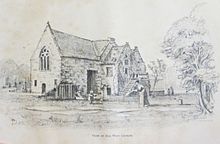New proposals to save future of historic Scottish Kirk in Greenock
The future of the Old West Kirk in Greenock (Scottish Gaelic: Grianaig) has been uncertain for some time. It is a building of historical importance. It was built by Johanne Schaw for the people of the town after the granting of a Royal Charter by King James VI of Scotland and was opened for worship in October 1591. As such it was the the first church built in Scotland after the Reformation in the 16th century. As the population grew and new churches were built, the Old West Kirk was closed in 1841 and the congregation moved to a new West Kirk.
The fortunes of the old kirk looked doubtful as it gradually fell into disrepair. However, it was restored and reopened on Christmas Day 1864. The architect James Salmon added a tower, and the church subsequently incorporated a major collection of Pre-Raphaelite stained glass windows. This remarkable set of windows was obtained through the efforts of Allan Park Paton, librarian of the Greenock Library, in consultation with Dante Gabriel Rossetti, founder of the Pre-Raphaelite Brotherhood and with the help of William Morris.
Then there was a new twist in the history of the building when it was moved, stone by stone, from its original site and rebuilt in Esplanade, Greenock in the 1920s to make way for the expansion of Harland and Wolff’s shipyard. The future of the church was once again under threat more recently when the the Church of Scotland sought to sell the building. However, the church is now an A listed building, which means it cannot be altered.
Now there is a new proposal under discussion, which could offer new hope for the Old West Kirk. Artist Alec Galloway is leading a campaign to preserve the future of the historic church, by turning it into a stained glass education centre. His aim is to run a degree course from the church as a satellite of Glasgow School of Art. It could also be a perfect venue for music, poetry and lectures. Redundant Churches Scotland (RCS) have been in discussion with him about his ideas and they are being put out to public consultation. For those unable to attend meetings on the issue, support for the suggested new use can be sent by email victoria@srct.org.uk.






